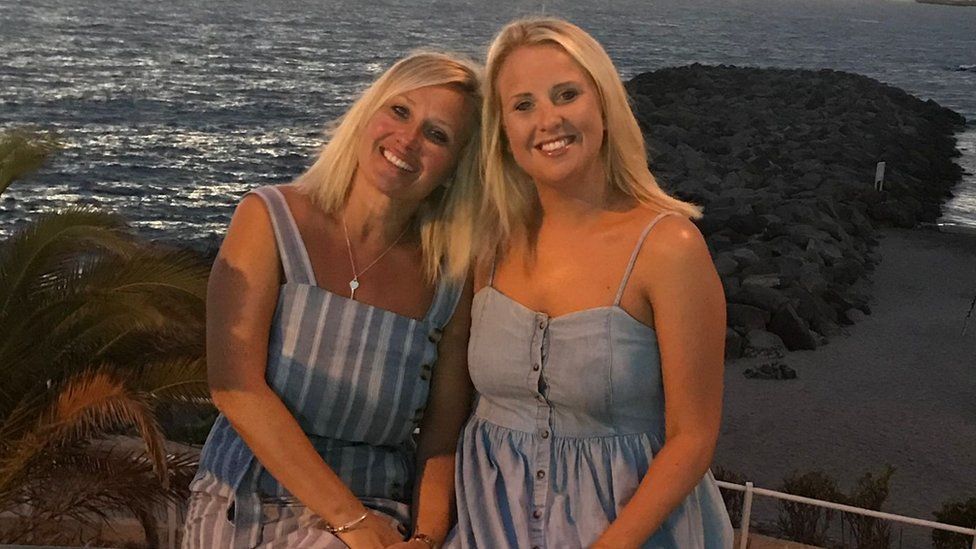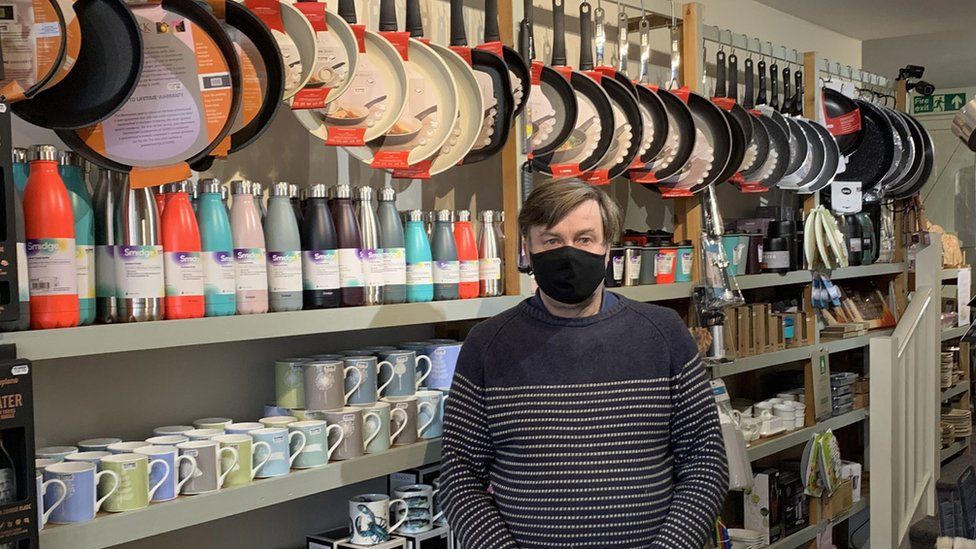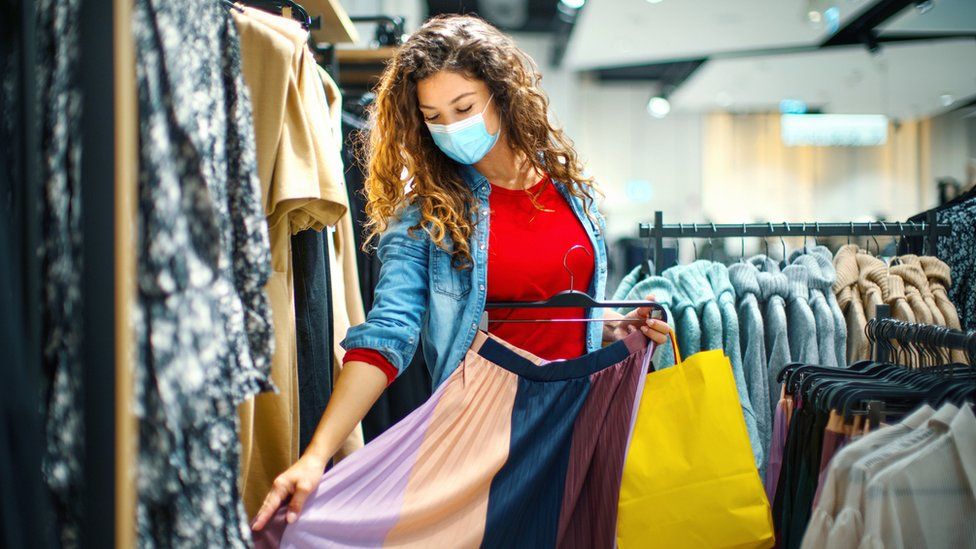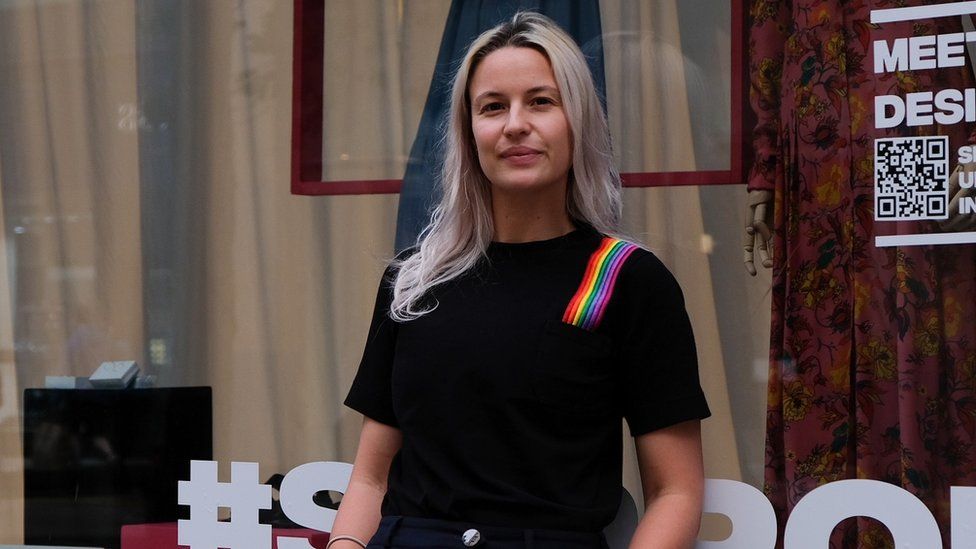Shopkeepers are concerned about enforcing mask-wearing and terrified they will have to close again.

Image source, The Dressing Room
From Tuesday, it will be mandatory for people to wear face coverings in shops and on public transport in England, the government has said, as a precaution against the new Omicron variant of coronavirus.
But shopkeepers are concerned that this could have a serious impact on their businesses, at a time when violence and verbal abuse against retail and hospitality staff is at an all-time high.
Here’s what people in the sector had to say.
Katie Pitts, co-owner of Leeds-based fashion boutique The Dressing Room, is worried that frustration over the pandemic might affect consumers’ spending behaviour this Christmas.
“We’ve got a lot of lovely customers who have helped us through a tough time, but people are a bit frustrated,” she says.
“We’re a non-essential retailer, so if they don’t feel like wearing a mask, they might not come in.”
Although The Dressing Room has a website, 70% of all sales still come from footfall to the store, as customers prefer to try clothing on before they buy, says Ms Pitt.
So far, no customers have declined to wear masks and Ms Pitts hopes it stays that way.
“It’s not a discussion we want to have, it’s not our rule, it’s a rule we have to go by,” she says.

Image source, Rye Cookshop
Nigel Bourne, the owner of Sussex-based cookware retailer Rye Cookshop, tells the BBC face covering rules should “never have gone out in the first place”.
He says he wishes the government would “be stronger on advertising” how people should wear masks, having experienced some customers wearing them wrongly.
The shop owner, based in Rye, East Sussex, says he hasn’t had to call the police over people not wearing masks as no one has been abusive. But he has had to ask people to leave his shop.
“It’s hard work all the policing of it. We do it for ourselves and for other people. I do not want to work in a shop where people are not wearing their masks properly.
“If the law says you have got to wear it, wear it.”

The guidance over how face coverings will be enforced in shops and on public transport will be set out in due course, the Department for Health and Social Care (DHSC) told the BBC.
The National Police Chiefs’ Council says police forces will “continue to enforce coronavirus regulations where it is necessary to do so” and will support transport and retail staff in ensuring people wear face coverings.
It is unclear whether penalties for those who refuse to wear masks without good reason will change. Previously, people faced a £200 fine which was reduced to £100 if paid within 14 days.
The fine doubled for each subsequent offence and could go up to £6,400 for the sixth and subsequent offences.
Assistant Chief Constable Owen Weatherill says officers will respond to incidents where “individuals are violent or abusive towards staff or members of the public” and will be more visible in towns and shopping centres.
According to the Office for National Statistics, 85% of adults said they had worn a face covering outside their home in the past seven days, with 70% saying they wore one often or always while shopping.
However, just 18% of people shopping said that everyone or almost everyone they saw was wearing a face covering.


Image source, Getty Images
According to consumer expert Kate Hardcastle, business owners are particularly worried about experiencing abuse, particularly when it comes to enforcing social distancing rules.
“Small businesses say they have felt intimidated – one told me they feel they can’t operate in their store by themselves,” she tells the BBC.
“They feel they have to have another presence there as support, in case something happens.”
Retailers are concerned about damaging the relationship with their customers, says Ms Hardcastle, at a time when they can’t really afford for anything else to go wrong.
“Not only is it unpleasant to deal with, but a lot of shop owners are experiencing recruitment issues. It’s not going to entice someone to go into a retail career if they have to cope with ongoing abuse,” she says.
But most of all, Ms Hardcastle says businesses are really “terrified” of being ordered by the government to close again.

Image source, Lone Design Club
Rebecca Morter, chief executive of sustainable fashion shop Lone Design Club, says she has encountered a couple of customers who don’t want to follow Covid rules on masks and social distancing in the past.
She agrees with Ms Hardcastle that retailers are most concerned about being forced to close again.
“Anything that helps prevent the new variant and keep the virus spreading is a good thing,” she says.
“I understand that some people disagree, but we really, really don’t want to go into another lockdown, so for us it’s important that everyone follows the rules so we can stay open.”
Manchester shopping mall the Trafford Centre tells the BBC it will be deploying staff to hand out free masks and encouraging shoppers to wear face coverings unless they are exempt.
Doug Russell, health and safety officer at shop workers’ union Usdaw, tells the BBC it is “extremely regrettable” that the government didn’t keep existing rules on masks in place as the country reopened.
Yet workers had no power to make customers wear them anyway, he adds, and that is unlikely to change this time.
The fact the issue “attracted so much aggression by a minority of people” is a “social bafflement”, adds Mr Russell.
He says the new rules are inevitably going to lead to more “clashes” between shop workers and small groups of people who refuse to wear masks.
“Shop workers have been at the forefront all the way throughout the pandemic.”